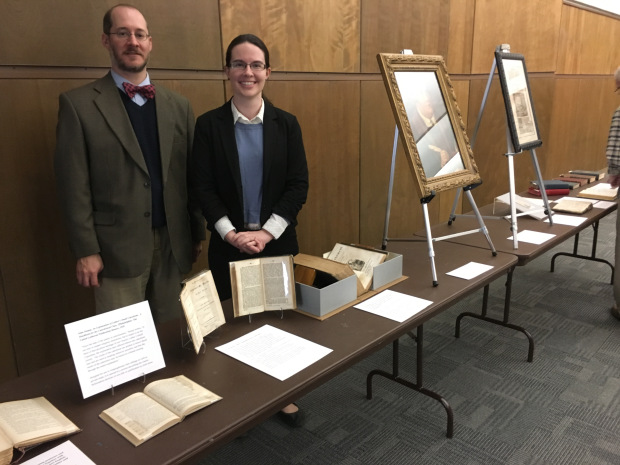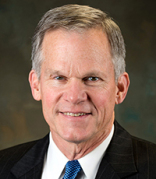
McGarvey Ice, left, and Amanda Dietz, brought part of the Martin Luther collection from the library at Abilene Christian University, to the Abilene Public Library Nov. 7 to display during the annual volunteer luncheon. These works, and more, all are available in the ACU library. Through the end of the fall semester, they will be gathered in one collection called, “Here I Stand: Martin Luther’s Reformation at 500.” Photo by Loretta Fulton
By Loretta Fulton
Many words have been spoken about Martin Luther’s defiant act during the 500th anniversary of his historic deed that marked the beginning of the Protestant Reformation and many more will be.

Dr. Robert Ellis
But perhaps none will sum up the action, and the consequences, quite as well as Robert Eillis’ words at a luncheon Oct. 31 at Hardin-Simmons University, the actual date of Luther’s act.
“It was the Post-It Note heard around the world,” said Ellis, interim dean of HSU’s Logsdon School of Theology.
Every speaker points out that what Luther did in one sense was quite ordinary. He posted a notice on a church door, something as common in 1517 as sticking a Post-It Note on the refrigerator is in 2017.
But the consequences were extraordinary. His “Post-It Note” was a list of 95 theses arguing that the sale of indulgences or pardons from sins, a practice adopted by a few priests, was wrong and should be banned.
Luther wanted reform, and he got the Protestant Reformation, plus a church named for him. He also got excommunicated from the Catholic Church.
Ellis was one of a long list of people who have spoken about the 500th anniversary of the beginning of the Protestant Reformation at Hardin-Simmons this semester. This semester’s Spiritual Formation Colloquium was titled, “Crises and Reform,” with weekly speakers. The colloquium started Aug. 31 and continues through Nov. 30.
Abilene Christian University will host a two-man panel at 4 p.m. on Nov. 14 in the Chapel on the Hill of ACU’S Biblical Studies Building. “The Reformation at 500 Years: Necessary Correction or Divisive Mistake: How Should it Shape Christians Today” will be the topic of the debate between John Armstrong, president of ACT3 Network, and Ryan Rojo, parochial vicar of the Cathedral Church of the Sacred Heart in San Angelo. Armstrong, a historian and ecumenist, participated in the production of the video documentary on the Reformation, “This Changed Everything.” The event is free and open to the public.
And, Abilene Christian University’s Doug Foster, professor of church history, presented two talks at First Central Presbyterian Church. Each of the talks has brought new insight.
 The presentations at Hardin-Simmons were based on Luther’s “solas,” which included “sola scriptura,” “sola fide,” “sola gratia,” solus Christus,” and “soli deo gloria,” or “scripture alone,” “faith alone,” “grace alone,” “Christ alone,” and “to the glory of God alone.”
The presentations at Hardin-Simmons were based on Luther’s “solas,” which included “sola scriptura,” “sola fide,” “sola gratia,” solus Christus,” and “soli deo gloria,” or “scripture alone,” “faith alone,” “grace alone,” “Christ alone,” and “to the glory of God alone.”
On Sept. 28, Mary Alice Birdwhistell, pastor of Calvary Baptist Church in Waco, spoke on the precept of “grace alone.” She said that at times, ministers feel the weight of the world is on their shoulders. They carrying the weight of what people say about them, the church’s finances and polarizing issues, plus the weight of the people’s concerns.
“Friends, ministry is heavy,” Birdwhistell said. “It is too much for any of us to carry on our own.”
Then, Ephesians 2:8 came to mind, “For it is by grace you have been saved.” The pastoral implications are great, Birdwhistell said. Pastors can run their lives and their churches like they depend on works, but there is always more work to be done.
Birdwhistell urged the future pastors at the forum to pay attention to the moments when grace shows up “and we have nothing to do with it.”
And, she urged them to take care of themselves and to nurture their own relationship with God. Ministry is not a to-do list, she reminded.
“Ministry is so much bigger than we are,” Birdwhistell said.

Dr. J. Bradley Creed
On Oct. 30 and 31, Dr. J. Bradley Creed, a church historian and president of Campbell University in Buies Creek, North Carolina, gave two lectures at Hardin-Simmons on the Reformation and also spoke at a luncheon.
Luther had a good sense of humor, Creed said, but suffered from a troubled soul. He was looking for peace and forgiveness. He was looking for a gracious, forgiving God in the church and couldn’t find him.
“He had a hard time with God,” Creed said.
Luther couldn’t find the God he was seeking in the church, but he did find him in the Bible, Creed said.
Five hundred years later, we might ask, “So what?” in terms of the consequences of the Reformation.
First, we take for granted we can own a Bible written in our own language.
“Martin Luther is partly responsible for that,” Creed said.
Luther was hidden in a castle for a year by friends who feared for his life. He was a marked man because of his rants against church practices. He didn’t waste the year feeling sorry for himself. Instead, he spent it translating the Greek New Testament into the German language.
Second, Luther may have been responsible for the first sexual revolution, Creed said. He broke from the church, married a nun, and became a matchmaker.

Dr. Douglas Foster
Doug Foster, church historian at Abilene Christian University, distributed a worksheet on a remarkable document at his concluding talk at First Central Presbyterian Church Nov. 1. The document was the “Joint Declaration on the Doctrine of Justification” signed by the Lutheran World Federation and the Catholic Church in 1999.
The doctrine of justification was of central importance in the Reformation. Luther argued that humans were justified by the grace of God, through Christ. In the 16th century, the church’s position was that people were saved by good works.
The joint declaration stated that, “In faith we (Lutherans and Catholics) together hold the conviction that justification is the work of the triune God.”
It further stated that, “We confess together that good works–a Christian life lived in faith, hope and love–follow justification and are its fruits.”
The last article of the joint declaration, Number 44, stated, “We give thanks to the Lord for this decisive step forward on the way to overcoming the division of the church. We ask the Holy Spirit to lead us further toward that visible unity which is Christ’s will.”
It took 482 years for Luther’s 95 Theses to result in the joint declaration, with numerous monumental reforms along the way, but it did, indeed, turn out to be the “Post-It Note heard around the world.”
Share this:





